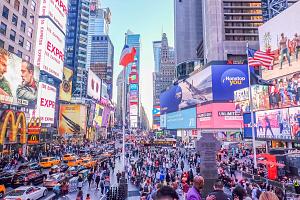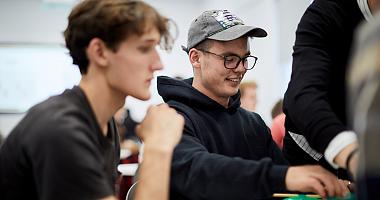BA (Hons)
Media & Communications
Content navigation menu
Why study BA Media & Communications at Goldsmiths
Bringing together media practice and communications theory, this degree covers a broad spectrum of critical perspectives on the media and will introduce you to a range of contemporary media practices.
- You'll study in one of the world's top media, communications and cultural studies departments, where you'll be taught by leading industry professionals.
- We believe in the importance of both critical thinking and creativity. That’s why you’ll spend 50% of your time learning critical theories, and 50% of your time gaining practical skills.
- On practice modules, you'll be taught by industry professionals engaged in TV, film, journalism, audio, photography, scriptwriting, short fiction, illustration, interactive media, animation, and media campaigning.
- Our forward-thinking theory modules will give you the opportunity to question the norm and learn about the media landscape of the future with topics ranging from Artificial Intelligence to Race and Technology.
- You'll be taught using industry-standard practice facilities, including TV/film, radio and photography studios, digital video and audio editing suites, and animation software and hardware.
- You’ll have the opportunity to apply for a work placement in the media or creative industries as part of the programme and be given dedicated support to help you find the right role for you.
- You'll be taught alongside students from all over the world and with diverse cultural experiences that enrich the department and the learning experience.
- You'll develop skills that you can use throughout your career whether in the media industries or elsewhere. Our recent graduates have gone on to have successful careers in and outside of the Media industry, ranging from television producers and podcasters to teachers and researchers.
Contact the department
If you have specific questions about the degree, contact Dr Vana Goblot.
UCAS code
P300
Entry requirements
A-level: BBB
BTEC: DDM
IB: 33 points overall with Three HL subjects at 655
Length
3 years full-time
Fees
Home - full-time: £9250
International - full-time: £20840
Department
Watch videos about your course
What you'll study
Year 1 (credit level 4)
Theory
In your first year you'll study five theoretical modules that introduce you to the major fields of study.
You take the following compulsory modules:
| Module title | Credits |
|---|---|
| Film and the Audiovisual: Theory and Analysis | 15 credits |
| Key Debates in Media Studies | 15 credits |
| Media History and Politics | 15 credits |
| Media Arts | 15 credits |
| Culture and Cultural Studies | 15 credits |
Practice
In the first year, you will take an 'Induction to Media Practice' introducing you to nine practice areas: animation, creative writing, journalism, illustration, interactive media, media campaigning, photography, radio, and television. You'll then choose two of these areas for further study.
| Module title | Credits |
|---|---|
| Induction to Media Practice | 15 credits |
| Filmmaking | 30 credits |
Note about optional modules (if available): The above is indicative of the typical modules offered, but is not intended to be construed or relied on as a definitive list of what might be available in any given year. The module content and availability is subject to change.
How the course is structured
The degree consists of 50% theory and 50% media practice. We aim to provide an inspirational learning experience in which theory and practice influence and enrich each other in the production of original, creative and intellectual work.
Teaching style
This programme is taught through scheduled learning – for example, through a mixture of lectures, seminars and workshops. You’ll also be expected to undertake a significant amount of independent study. This includes carrying out required and additional reading, preparing topics for discussion, and producing essays or project work.
How you'll be assessed
You’ll be assessed by a variety of methods, depending on your module choices. These may include coursework assignments such as extended essays, reports, presentations, practice-based projects or essays/logs, group projects and reflective essays, as well as seen and unseen written examinations.
Credits and levels of learning
An undergraduate honours degree is made up of 360 credits – 120 at Level 4, 120 at Level 5 and 120 at Level 6. If you are a full-time student, you will usually take Level 4 modules in the first year, Level 5 in the second, and Level 6 modules in your final year.
Student videos and animations
Examples of written work
Read examples of their journalism on our news sites East London Lines and see examples of students' work on GoldDust.
Skills and careers
Skills
Some of the skills you'll develop during a Media and Communications degree include:
- Critical and analytical skills.
- Proficiency in assessing evidence and in expressing ideas clearly.
- Ability to bring together insights from a range of subjects.
- IT skills.
- Visual and audio communications skills.
- Journalistic and creative writing skills.
Careers
Alumni from the Department have gone on to careers in television, radio, the press, publishing, film-making, advertising, marketing and public relations, web design, teaching and research, advertising, arts and administration, business and industry, European Union private sector management and personnel work, and many more in the media industries and beyond. You can read more about possible career options after graduating on our Media and Communications careers page.
Find out more about employability at Goldsmiths.
Your future
A degree in Media and Communications offers a wide range of topics. In terms of future employment, this means you can focus on areas of interest and use these to help decide on a career area. You will also develop skills that you can apply in the workplace.
The skills you gain from a Media and Communications degree
You'll develop a variety of skills that are useful in many employment areas. Examples of these skills include:
- Critical analysis.
- Research.
- A broad commercial and cultural awareness of the media and creative industries.
- Teamwork.
- The development of creative work in writing, audiovisual or other electronic media.
- A flexible, creative and independent approach to tasks and the ability to work to a brief and meet deadlines.
- Transferable skills within social and critical theory, aesthetics and performance, communication and multimedia.
- A critical appreciation of current debates in the media, the culture industries and the wider contemporary cultural environment.
Where our graduates work
Here are some of the industries that Media and Communications graduates work in:
Advertising, marketing and PR
Advertising is a creative and fast-paced industry and is now a globally big business. BBH London and JWT London are two of the major players in the UK.
Marketing professionals generally create, manage and enhance brands in consumer goods and services. Marketing opportunities can be found in most large organisations in the private, public and not-for-profit sectors. Entry-level positions and graduate schemes are particularly numerous in retail, manufacturing, energy, banking, finance and the pharmaceutical industry.
Public relations (PR) has grown in importance as a marketing tool and is now considered a critical component of the marketing mix. Roles exist in-house or in consultancies/agencies. Some consultancies specialise in one sector, eg healthcare or IT. Bell Pottinger Group and Brunswick are two of the top 10 PR agencies.
Media, publishing and creative industries
Many graduates enter the creative and cultural industries. This could be in areas as diverse as film, publishing, design and visual arts.
In the UK, the media sector employs around 550,000 people and encompasses opportunities from animation, computer games and film production to interactive media, radio and television. In journalism, there are three broad areas: broadcast, magazine and newspaper. Broadcast journalists are responsible for investigating, gathering and reporting on news and current affairs presented through news bulletins, documentaries and other factual programmes for radio, television and online broadcast.
The biggest broadcast TV stations are the BBC and Sky, and the BBC dominates the airwaves with 10 distinct national radio channels. The publishing industry in the UK is vast, producing printed and digital information for individuals and businesses. Bertelsmann Media Group, Pearson PLC and Hodder & Stoughton are some of the major players
Charities and non-governmental organisations (NGOs)
A passion for people and improving the world takes many of our graduates into this sector. Within charities and NGOs there are many roles from PR and communications, to fundraising, administration and research. There are also more hands-on roles managing projects in the field or working with communities/disadvantaged groups to train, empower or support.
These organisations will be particularly interested in your communication skills especially in terms of getting their messages out.
Central and local government
The Civil Service Fast-Stream fast-tracks graduates into policy roles. If you fancy local government there is a similar scheme called the National Graduate Development Programme (NGDP).
Social research organisations and think tanks
The biggest employer is the Government Social Research Profession (GSR) where you could be working on anything from community cohesion to gender equality. There are other organisations in this field of work ranging from university-based research institutes and think tanks to consultancies with one or two self-employed individuals.
Where our graduates work
Our graduates go on to work in a huge variety of industries and many of our graduates now work as translators, curators, writers, researchers, editors and web designers. Some of our recent graduates now work for companies as diverse as McCann Advertising Agency, Shazam, Greenpeace and The Purple Agency.
Entry requirements
We accept the following qualifications:
A-level: BBB
BTEC: DDM
International Baccalaureate: 33 points overall with Three HL subjects at 655
UAL Extended Diploma: Merit overall
Access: Pass with 45 Level 3 credits including 30 Distinctions and a number of merits/passes in subject-specific modules
Scottish qualifications: BBBBC (Higher) or BBC (Advanced Higher)
European Baccalaureate: 75%
Irish Leaving Certificate: H2 H2 H2 H2
Alternative qualifications and experience
See our full list of undergraduate entry qualifications.
We welcome students with a range of educational experiences. If you believe you may not meet the standard qualification requirements we would still encourage you to apply because we consider all aspects of your application when making a decision.
We’ll pay particularly careful attention to your personal statement, which is your opportunity to demonstrate your interest in the subject you’ve applied for. Your referees are also welcome to include any relevant contextual comments around your academic achievements. We’ll look at all these things when making a decision on your application, as well as your qualifications and grades, and may still be able to offer you a place.
International qualifications
We also accept a wide range of international qualifications. Find out more about the qualifications we accept from around the world.
If English isn’t your first language, you will need an IELTS score (or equivalent English language qualification) of 6.0 with a 6.0 in writing and no element lower than 5.5 to study this programme. If you need assistance with your English language, we offer a range of courses that can help prepare you for degree-level study.
Transfers/direct entry
Please note that this programme does not accept transfers/direct entry into year 2.
Fees and funding
Annual tuition fees
These are the UG fees for students starting their programme in the 2024/2025 academic year.
- Home - full-time: £9250
- International - full-time: £20840
If your fees are not listed here, please check our undergraduate fees guidance or contact the Fees Office, who can also advise you about how to pay your fees.
It’s not currently possible for international students to study part-time if you require a Student Visa, however this is currently being reviewed and will be confirmed in the new year. Please read our visa guidance in the interim for more information. If you think you might be eligible to study part-time while being on another visa type, please contact our Admissions Team for more information.
If you are looking to pay your fees please see our guide to making a payment.
Funding opportunities
The Royal Television Society (RTS) runs two bursary schemes - the Technology Bursary and the TV Production and Journalism Bursary. The schemes are designed to support people from lower-income backgrounds to pursue a career in the television industry.
RTS bursary recipients benefit from:
- Financial support
- Free RTS membership
- Networking events
This prestigious award also offers a real opportunity to gain insight into the industry and build a network of key contacts. As a bursary recipient you receive £1000 per year of study, membership of the Royal Television Society and affiliate membership of the Club while studying, one year's free membership of the Royal Television Society when you graduate and in the second or third year of your programme we will aim to set up a mentoring opportunity with one of our many industry mentors.
If you are interested in current affairs journalism or documentary production, your application can be considered for one of two Steve Hewlett awards, worth an extra £1000 per year.
For more details, visit the RTS website.
We offer a wide range of scholarships and bursaries, and our careers service can also offer advice on finding work during your studies. Find out more about funding your studies with us.
Additional costs
In addition to your tuition fees, you'll be responsible for any additional costs associated with your programme, such as buying stationery and paying for photocopying. You can find out more about what you need to budget for on our study costs page.
There may also be specific additional costs associated with your programme. This can include things like paying for field trips or specialist materials for your assignments. Please check the programme specification for more information.


